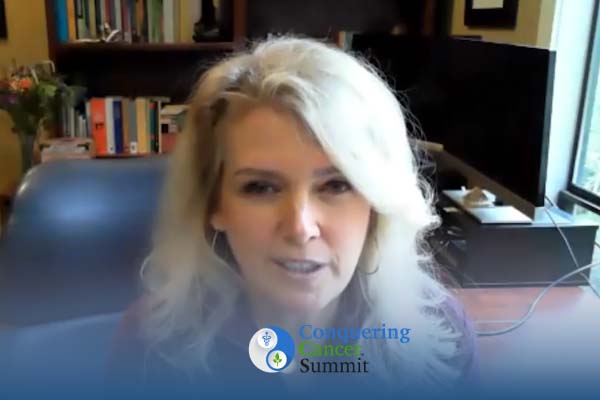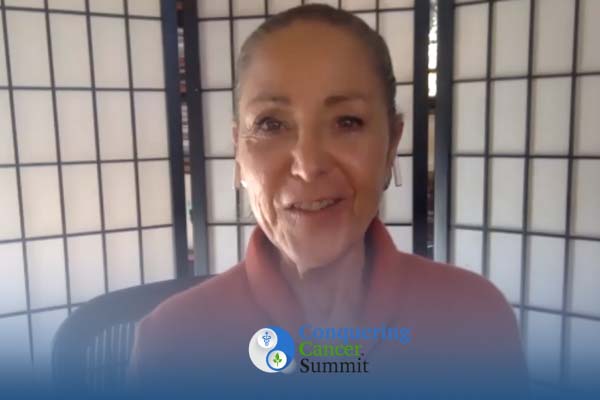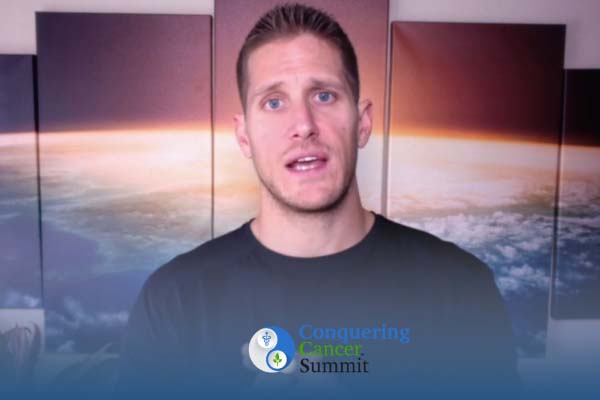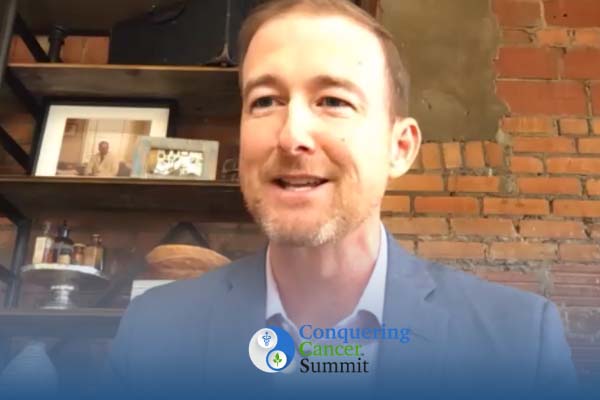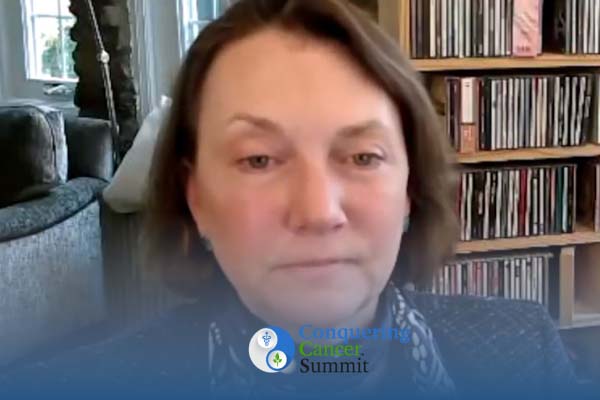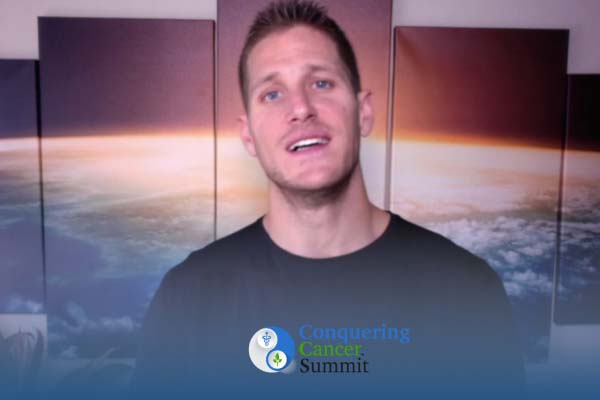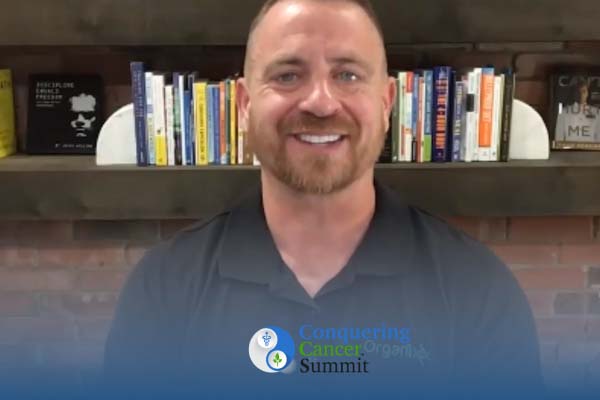Join the discussion below
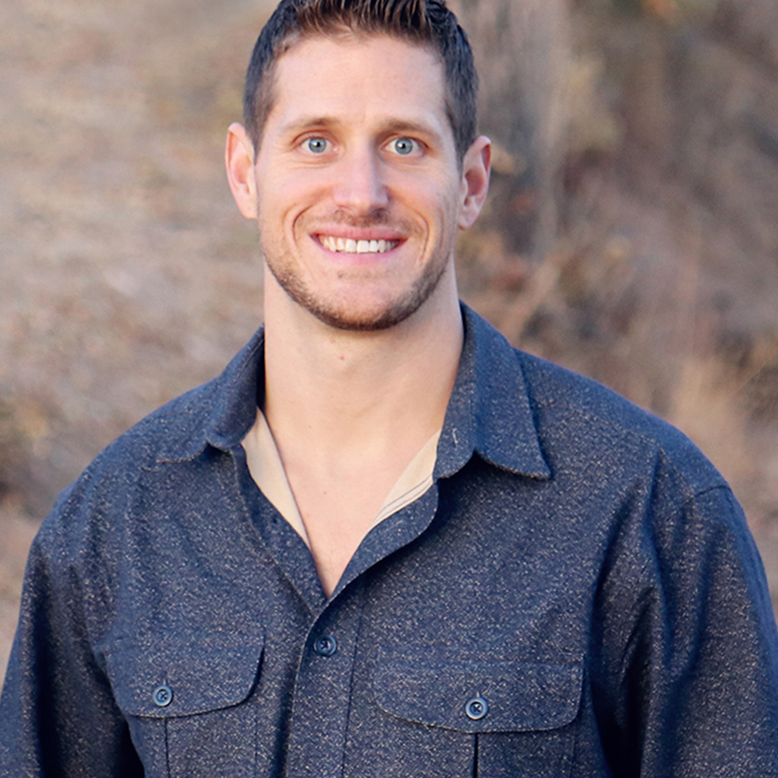
Nathan Crane is an award-winning author, inspirational speaker, plant-based athlete, event producer and 18x award-winning documentary filmmaker. Nathan is the Founder of The Panacea Community, Creator of the Global Cancer Symposium, and Director and Producer of the documentary film, Cancer; The Integrative Perspective. He is also the Director of Strategic... Read More
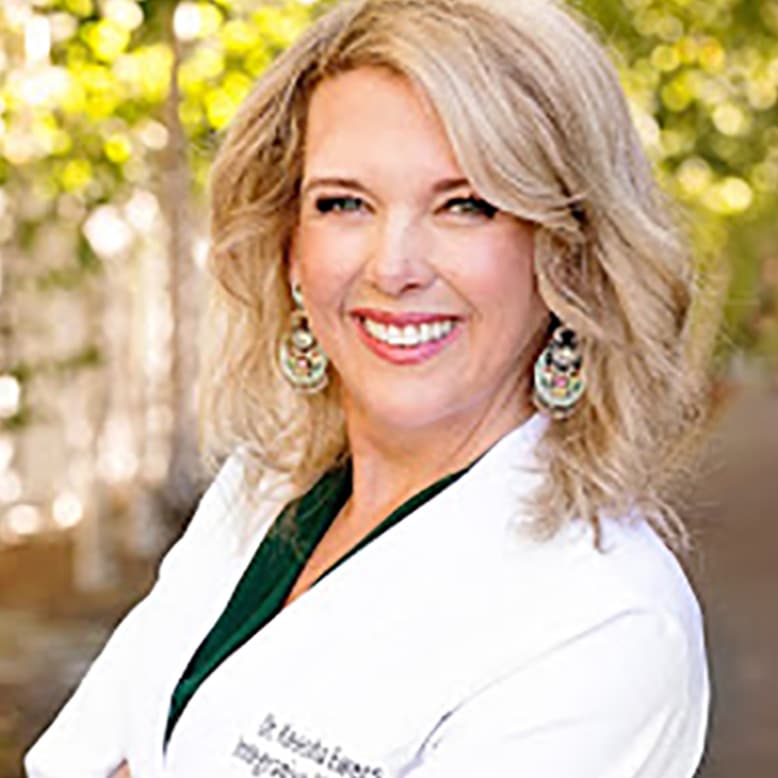
Keesha Ewers, PhD, ARNP-FNP-C, AAP, IFM-C
Dr. Keesha Ewers is an integrative medicine expert, Doctor of Sexology, Family Practice ARNP, Psychotherapist, herbalist, is board certified in functional medicine and Ayurvedic medicine, and is the founder and medical director of the Academy for Integrative Medicine Health Coach Certification Program. Dr. Keesha has been in the medical field... Read More
- How Dr. Keesha overcame autoimmune disease and cancer.
- Why genetics dont have to be your destiny and what to do about genetic pre-disposition.
- How to overcome the emotional trauma of sexual abuse.
- How to heal from childhood trauma that is likely causing your cancer.
- The personality P’s that lead to cancer and how to remove them from your life.
Related Topics
Abuse, Anger, Autoimmune Disease, Ayurvedic Medicine, Biochemistry, Cancer, Chronic Disease, Chronic Illness, Diet, Disease Pathway, Emotional Health, Emotions, Forgiveness, Genetics, Guilt, Healing, Liver, Lymphatic System, Mindset, Self-forgiveness, Shame, Trauma, YogaNathan Crane
Hey it’s Nathan Crane, Director of the Health and Healing Club and Host of the Conquering Cancer Summit and today I am honored and excited to welcome you to a very special interview. Dr. Keesha Ewers is board certified in functional medicine, and Ayurvedic medicine, a Doctor of Sexology, which is a new one for me. I should learn more about that. A Psychotherapist, a family practice advanced registered nurse practitioner with a specialty in integrative medicine. She’s a Conscious Dying Doula, which we need more of nowadays, especially with our culture at least here in the United States where death is this topic that is so taboo and conscious dying, oh my gosh, what an amazing thing. Maybe we’ll dive into that today.
I wasn’t even planning on it but it’s such a powerful topic I think worth discussing. She’s a master’s of divinity student and the founder and medical director of the Academy for Integrative Medicine Health Coach Certification Program. Dr. Keesha has been in the medical field for over 30 years. After conducting the hurt, H-U-R-T, study in 2013, which stands for healing, unresolved trauma. She developed a hurt model for understanding how past childhood trauma impacts adult health.
This led to the creation of You Unbroken online program for patients to heal their own trauma and the mystic medicine, deep immersion healing retreats, she leads at her home in San Juan Island, Washington. Dr. Keesha is a popular speaker, including at Harvard and from the TEDx stage. And she’s the best-selling author of “Solving The Autoimmune Puzzle: The Woman’s Guide to Reclaiming Emotional Freedom and Vibrant Health”. You can learn more about her great work. Pick up copy of her books and learn more about her great online programs at drkeesha.com as D-R-K-E-E-S-H-A drkeesha.com. All right, Dr. Keisha, thank you so much for joining us.
Keesha Ewers, PhD, ARNP-FNP-C, AAP, IFM-C
Thank you so much for having me Nathan.
Nathan Crane
So something I found out just recently about you, was that, you went through your own cancer journey. Why don’t we start there? What was your diagnosis? And when exactly was that?
Keesha Ewers, PhD, ARNP-FNP-C, AAP, IFM-C
Yeah, well, I’m gonna start when I, I’m 55 right now. And when I was 30, I was diagnosed with rheumatoid arthritis. And I had four little kids, I was running marathons, I was an ICU nurse and my life came to this screeching halt. So I went in with 10 pounds of puffiness all over my body and lots of pain. And I was asked by my physician that I was seeing that day, “So do you have autoimmune disease in your family history?” And I said, “Yeah, my grandfather had rheumatoid arthritis.” And actually, Nathan, he died at the age I am today, at 55 in a wheelchair. So, I didn’t know any of the stuff we’re gonna be talking about today, right?
So she said, “Okay, well it looks like you drew the short end of the genetic lottery my dear, right?” Closes the book, puts it on the shelf and hands me a prescription. You hear this all the time of methotrexate and a very strong non-steroidal anti-inflammatory drug. And as I’m driving home, I’m thinking about the side effect profile of these drugs, ’cause I knew them. And then I really don’t want to do this, and there must be another answer to this question that I had asked her which is, “Hang on, hang on, is there anything else?”
And she said, “No.” Right? And unfortunately people are still being told this, right? Diet has nothing to do with anything, et cetera, et cetera. So I started diving in and doing my own research and I found in PubMed a study on yoga and autoimmunity. I went to my first yoga class, and from there I learned, “Oh, Ayurvedic medicine which is the sister science of yoga actually says that, “Cancer and auto-immune disease are undigested anger.” And I remember kind of sitting back in my chairs, I’m looking at my computer with a dial up modem, way back then and going, “But I’m not an angry person.” And then thinking to myself at the very next minute, like, “Oh, that might be a problem.” Then I don’t even allow anger, I don’t acknowledge it, and I don’t know how to express it for sure.
So through a ten year period, I really dove into this. I did a bunch of deep work. I learned that I had been, I already knew, but I learned that the sexual abuse that I had had at the age of 10 from the vice principal of my elementary school, had a great deal to do with my RA 20 years later. And I went in and I started doing a bunch of deep trauma work around that. Well, within six months my RA was gone and it’s never been back, okay?
So I cleaned up my diet, I found out that I was really, really sensitive to gluten, took that off my menu. I found out that I was a sugarholic, I took that off my menu. I stopped running marathons and beating the crap out of my body. I started really healing the perfectionism, and the people pleasing that I had going on in my character style. So for 10 years, everything was really healthy. 10 years after that, so I was about 41. My son was home from college. I have four kids, two boys and two girls. And my second son said, “I need to talk to you mom.” I said, “Oh, this sounds serious.” And he said, “Well, kind it is.” And he sat me down at the dining room table and he said, “I just want to let you know.”
And he tells me the story of he and his brother and probably his youngest sister being sexually abused by a neighborhood boy. That I had left in his care as a babysitter a couple of times. Now, with my own history, like to hear that was, oh, my gosh, anyone that’s a parent. It was the worst thing, right? And I just, of course lost it completely. And I was like, “Aaakh!” And I said, “How come you never told me this?” And he said, “Because of this. Like I didn’t want you to think my childhood was defined by this one event.”
Nathan Crane
Wow!
Keesha Ewers, PhD, ARNP-FNP-C, AAP, IFM-C
And he said, “But there’s some things happening in my life with relationships. I think I need to do some work around this.” And so I called up the guy that had done this. He had been 12 years old at the time. And I remember distinctly opening the sliding glass door, and looking down in our yard at him and my kids bouncing on the trampoline and going, “Hey, do you want to stay and babysit while I take the baby to the grocery store?”
Like I can see that, it just burned into my mind, that choice point that I made of leaving my kids with him. So I called him up, I found him. And he said, when he heard my voice and I identified myself, he said, “This is yours, I’ve been waiting for this call for 15 years.” And I remember thinking like, yeah, like, “This isn’t just about my children, it’s this whole like there’s pain in this whole system right here.” And so I had a bunch of questions for him. Number one, being, how could you have done this to my kids when I put them in your care? But you know, like we went through this whole over a few month’s period, this whole forgiveness process that I helped facilitate and I’m gonna give your audience, like it’ll be a purchase bonus for your group because it’s an amazing. And I’ll tell you what it did for me.
So we went through this whole thing and I had him pay for some of that therapy. And like we did this really great process, right? My kids responded really well. Everything was good. Four months after that I get diagnosed with breast cancer tumor. Where is it? Right over my left breast. Like heartbreak shatter, right? Like that is where it was, I went in there and I had an ultrasound. I could feel it. And I went in, I had a diagnostic ultrasound and there’s this beautiful blood supply to this tumor is just so alive, right? And I looked at it on the screen and I went, “Oh, I know exactly where that came from.” I know exactly where that came from.
And I said, give me a month and then I will come back. And, and so during that month I didn’t have a diet to clean up. I didn’t have the way that I was dealing with my world. I wasn’t people pleasing, I wasn’t a perfectionist anymore, I wasn’t beating the crap out of my body in marathons any longer. What happened, and I knew it, was that I had this shame and this guilt that was so toxic, coursing through my body that it had completely sludged up my lymphatic system, my liver wasn’t filtering anymore. I was not digesting that shame and that guilt. I had left even the perpetrator off the hook, right? But not me.
Nathan Crane
And you blamed yourself, right?
Keesha Ewers, PhD, ARNP-FNP-C, AAP, IFM-C
Oh, because I was 100% responsible. 100% responsible. And that image, right? And it would just bring me to my knees with tears of shame and guilt and just like, oh! And I knew when I saw that tumor that it was do or die. I had to forgive myself or I would die. And it was the hardest thing, Nathan in my entire life that I’ve ever had to do was to forgive myself. And in that month I did. I started about like going through the process of really doing that self forgiveness. And a month later I went in, I had another ultrasound and there was like, there was this vascular system just hanging in there in an empty space. There was no tumor.
Nathan Crane
Wow!
Keesha Ewers, PhD, ARNP-FNP-C, AAP, IFM-C
And of course they all just, I was like, checking what? And I said, “I knew why it was there. I knew exactly what I had to do.” I don’t tell this story very often because I don’t want people walking away saying, “Oh, I can just like, think of myself out,” right? Which you could say, but I actually knew like the thing had guilt and shame written on it. The pictures in my head were directly represented in this tumor, I knew where it was from. And within a month it was gone, and it’s never been back.
Nathan Crane
Was it diagnosed at stage one, is that what you said?
Keesha Ewers, PhD, ARNP-FNP-C, AAP, IFM-C
Aha. And here’s the other thing, is I have these genetics. I do genetic testing on a hundred percent of my patients. And I have these genetics, my cytochrome P4501B1, terrible. When I first did my very first estrogen metabolite pathway test, and I looked to see like, is that 1B1 causing problems for me? Oh yeah. I actually had to call Genova and talk to their medical director and say, “Is there some kind of fluke here because I’ve never seen one this bad.” She goes, “Dr. Ewers, I’m afraid, I’ve never seen one of this bad.” So this was, like I have the physicality that is prone to cancer.
My dad has cancer currently, he’s had it since 2004, chronic lymphocytic leukemia. My mom has had breast cancer, my grandmother has had breast cancer. So it’s not like I don’t have the genetics and the biochemistry that’s primed for this, but what is it that made that happen four months later, right? Right then, and go away that quickly? So you have to know, like this emotional piece is so strong in how it upregulates your genetics, how it affects your filtration system. Like it’s so important. If you’re not digesting your emotions, then it can act, they can hang around and they can then have you express this stuff in a disease pathway, right?
Nathan Crane
You know what’s really fascinating about that is, I did an interview with Otis Wallin, who’s not part of the symposium but it’s actually just a free thing, that’s on YouTube. And it was about his story with kidney cancer. And he went through, he discovered something similar in himself as he was doing meditation and practicing Qigong and sitting with himself quietly, he discovered that he had a lot of pent up anger and blame and guilt and all these things as well. And when he realized that, and then his practice was to go into a practical wisdom healing Qigong, which is sound healing and mentally emotional healing and this whole ancient practice. But every time he’d go back in every few months to get it checked on, it had shrunk.
And every time he was doing these practices, it shrunk more and shrunk more shrunk more. And then it got to a point where he felt he totally resolved the anger inside of him. And then he was able to do a cryo blast session. I believe it’s called, where they basically just freeze the tumor and then it was gone, and it had not come back since. And he felt that as it was shrinking and shrinking. And so for him that was months and even maybe a couple of years process, right? Where yours was boom, a month, it was gone. You got to the root.
Keesha Ewers, PhD, ARNP-FNP-C, AAP, IFM-C
But I had already been doing so much abut this, right? I had preceded my path. I had done this trauma work on own sexual abuse. Like I had really, I was pretty clean to that point, right? And then that drops in, and then it was easy to get balanced again. Now I have a woman that is my very best friend in the world.
And I only met her three years ago, when I was in a medicine circle. So I facilitate medicine circles for trauma healing also. And I heard her across the room, I’d never met her before. And she was talking about just being diagnosed with metastatic stage four cancer. It was in her bones in her spine. And she was telling the story of having been caught, and her son and her husband were with her in this medicine circle.
She’d had two DUIs and been caught having an affair, and she had all this shame and guilt. And I heard her across the circle and I was like, “Oh!” And so I went and I sat down in front of her and I put my hand on her heart, which is exactly where hers was, right? I said, “This isn’t going away until you can forgive yourself.” And she just broke down and she said, “I cannot, I cannot.” Right? My son is the one that caught me. And her son seemed, “Like I have forgiven you.” And I said, “If you don’t do this, you will die.” And sure enough, like I worked with her every single day for three months on this process every day. And I took her up in the mountains, we did a vision quest at the Lakota. And when she had her next PET scan, 50% shrinkage.
Nathan Crane
Wow!
Keesha Ewers, PhD, ARNP-FNP-C, AAP, IFM-C
And she had not completely forgiven herself yet. And I said, “See, you’ve got to finish this, right? 50% shrinkage. And then she got really sick of doing the process, and she said, “I’m done with this. I’m so done with thinking about myself.” It grew.
Nathan Crane
Oh, wow.
Keesha Ewers, PhD, ARNP-FNP-C, AAP, IFM-C
And then she got back on it. She did another PET scan and had shrank. I mean, I was like, “Okay, this is sort of like the gas gauge in your car.”
Nathan Crane
right there, right?
Keesha Ewers, PhD, ARNP-FNP-C, AAP, IFM-C
It is that powerful. And it was like, there’s nothing else that had to be done for her, it was just that. And when I say just, it’s the hardest thing.
Nathan Crane
Sure.
Keesha Ewers, PhD, ARNP-FNP-C, AAP, IFM-C
It’s the hardest thing, right?
Nathan Crane
And that’s the thing like you were talking about earlier. Like if your diet is really, you’re following the brightest minds that I’ve interviewed for this symposium on the most scientifically advanced anti-cancer diet, and you’re following that. And you’re doing what I call
Keesha Ewers, PhD, ARNP-FNP-C, AAP, IFM-C
You can quickly tell and
Nathan Crane
Yeah. And you’re doing what I call medicinal movement every day, which is literally 45 to 60 minutes of different forms of movement at least five to six days a week. And you’re doing yoga and Qigong and meditating and you’re doing the whole package, and yet you’re not seeing tremendous results. What you’re talking about is like often the crux of it. Is getting to the deep emotional wound and healing it. And would you say that more often than not, the thing that needs to be done is to either forgive yourself or forgive somebody else or both?
Keesha Ewers, PhD, ARNP-FNP-C, AAP, IFM-C
The thing I call it, the freedom framework, and it’s a puzzle the way, I think we’re all unique. There’s not one way of doing things for anyone, right? But the four corner pieces of the puzzle are the same and that’s gut health, it’s toxic burden, and your body’s ability to get rid of those toxins. It’s your genetics, for sure genetics play a part in this, right? And the fourth one, and I call it the missing piece of the puzzle is how you deal with your stress and your past trauma. And that is the one that fits in that actually affects cortisol release. As you know, like you said earlier, if you’re always in a sympathetic arousal state, you’re releasing cortisol which is breaking down your gut wall.
It’s doing other things too, but when we’re talking about that, that intestinal integrity. As long as you’re in that place of, “I’m always a victim, I’m not safe, I’m not good enough, I’m not…” All of those self limiting belief structures that come from trauma. And everybody has had trauma, 100% of us. It’s just that many may not have had the capital T trauma that’s talked about in the adverse childhood experiences study. The ACE study actually is the science behind all this that says, “Yes, the higher those adverse experiences from childhood, the higher the number, the higher the risk for every single chronic illness that we have in our society today. As well as relationship dysfunction and addiction and the lack of self care.” And like all those things, right? Self neglect.
So it becomes really important in the ACE study that I did was why did the ACE study come up with what it came up with? I wanted to know the why, like track it, How does that work? And so I would say, Yes, it is, but also if your genetic show like you’re an APOE4, for example, which means that your liver is not gonna metabolize alcohol and animal protein and fat very well. And if you continue to eat that, then you’re going to have trouble.” And so I think that probably most of the people that focus over lives study, were APOE4s. And that’s why we have such conflicting studies. That’s why I do genetics. I’m like, “Let’s look and see what’s the dietary program your DNA is asking for, right?
What’s your, your Ayurvedic dosha balance? What’s going on?” And the trauma piece is the one that actually upregulates all that stuff. And I always think of toxic burden is not just PCPs in the environment, not just EMFs, but also the toxicity that you have in here. I think of resentment as the most toxic chemical that can ever be manufactured on this planet. And it’s not being manufactured by corporations and dumped into air, soil and water. It’s being manufactured right here and being dumped into the terrain that ourselves are bathing in.
Nathan Crane
And it almost
Keesha Ewers, PhD, ARNP-FNP-C, AAP, IFM-C
And you’re breathing yourselves resentment, you will get sick and die. That is gonna happen.
Nathan Crane
Yeah, I mean it’s such an important thing what you’re saying for people to understand. And it’s almost always happening subconsciously. When I was kind of getting to you earlier about in themasterclass that I’m teaching, there’s an entire module on this subject that I call parasympathetic mastery. But woven through the entire masterclass because it’s so important as this exact topic right here. There’s the stressors in our lives and the emotions that lead to constantly inflamed system that is toxic. Because we know that these intense emotions, these emotions they’re derived from fear, they’re derived from anxiety, they’re derive from stress. Whether it’s the stress of watching the news in the morning, and it’s just as low grade stress, whether is the stress of someone cutting you off in traffic and you’re getting pissed off at them, the stress of having to get home in time to make dinner, to pick up the kids or whatever, that constant low grade stress is exactly
Keesha Ewers, PhD, ARNP-FNP-C, AAP, IFM-C
For a lot of women not getting through your task list at the end of the day or not being able to make every single person happy. That’s the people, I always say that people with cancer and auto-immunity have four 4Ps, people pleasing perfectionism, holding onto the poison of past pain. And then the last one is the Ayurvedic one, which is really interesting because Ayurveda is an elemental science and it’s people with more fire, the Pitta people. There’s other people that have the sharp minds, they’re very, very intelligent but they’re also very judgmental towards themselves first, and then it can kind of leak out on other people. And they’re so quick and it causes inflammatory mind which then translates as the hypervigilance, makes a hypervigilant immune system.
Nathan Crane
Right.
Keesha Ewers, PhD, ARNP-FNP-C, AAP, IFM-C
So that’s the microcosm of the macrocosm whatever’s going on up here is happening in the body.
Nathan Crane
And it’s, I think one of the first steps I know for me, I was just talking with my wife about this the other day. ‘Cause we were listening to a program, I don’t remember what it is, but with my children in the car, we listened to all kinds of educational, personal development, spiritual growth programs, constantly. Podcasts on the phones, on the TV, you put on documentaries in the car. So we utilized all that time to learn and to help ourselves and my own children to learn and grow. And someone said, I can’t remember who it was, but someone was on the program and said, “Do you constantly wake up and have negative thoughts? Or have stressful thoughts? Or have these negative thoughts about yourself? Or about the day you’re…” They were talking like most people do. And I thought for a moment and I was like, “No, I don’t, and I haven’t had them for a very long time.” And I asked my daughter, I said, “Do you ever have…?” She’s 10 years old. “What are your thoughts when you first wake up?” And so, I’ve trained basically to wake up with happy thoughts. I always say happy things to her right before bed her and my son, I would say as soon as I wake up, “Are you ready for a great day today? Today’s gonna be a happy, healthy day.” I always just programmed that, right? ‘Cause I wasn’t programmed that way, I was programmed with fear, with anxiety, with negativity with worry, all these things as a child, I think like most of us are.
So she doesn’t ever have negative thoughts at least as a 10 year old, what would she be negative about? Hopefully she takes that into the rest of her life. But I recognize in myself like I stopped having those thoughts years ago because of an awareness and a practice. I was reading the Bhagavad Gita, and I was meditating at night, and I was reading and meditate and go to sleep. And this was probably in 2007 maybe. And I remember waking up one morning, and I had this first awareness that, “Oh my God, my thoughts are all negative when I first wake up.” And I never realized that before, I’d never recognized it, there was just no awareness. And it was like the worry of my life at the time, which was a pretty, not a very pleasant life for most people. I was living on a little mattress in someone’s living room. I didn’t have enough money to even pay for gas, to drive, to sell T-shirts down and embark on there appear in San Diego.
Like it was a pretty stressful life at that time. And this cat would come and pee on my bed all the time ’cause he didn’t want me in their house. And I remember I wake up with all these negative thoughts. And I caught myself for the first time, I said, “That’s it no more.” And I started waking up and practicing, focusing on things like gratitude and forgiveness and setting good thoughts in my mind to start the day. And all these things and it turned to a practice since then. And it’s been automatic ever since, right? And people, I think it’s so important to recognize the power of this. The power of being in control being in control of your mind, right?
Keesha Ewers, PhD, ARNP-FNP-C, AAP, IFM-C
I teach healing trauma through the chakra system program, and in every single module, there’s a picture that I put in every one of them. And it’s a picture of a little kid in a grocery store, like making all the cans go everywhere with one of those styrofoam noodles, like creating chaos in the grocery store, right? And what I always say is like, If you’re a shopper in that store and you go around the corner with your cart, and you see this kid creating chaos in the grocery store, the first thing you’re gonna look for is like, “Where’s that kid’s parent?” Right? And then if you see, oh, here comes this woman racing around the corner and she’s like, “Johnny!”
And then you hear her say, “Don’t do that anymore, okay?” And then walk away and Jenny keeps doing that, then you’re gonna think, “Oh!” But if you see a parent come around the corner and kneel down in front of Johnny and put her hands or his hands on their shoulders and look at them in the face and go, “Johnny, this is not how you behave in a grocery store. Right now, we’re going to clean this up. I’m gonna show you how and you’re gonna replace your divot. And here are the consequences if you ever do this again.” Then you go, “Okay, this child’s being trained how to behave in a grocery store.”
Nathan Crane
Yeah.
Keesha Ewers, PhD, ARNP-FNP-C, AAP, IFM-C
People always think their nervous system is sort of this passive thing or their thought patterns, right? That you just have to watch it do whatever it’s going to do. And that’s like the little kid in the grocery store creating chaos. You actually can intervene and train your mind. You can say, “Nope, that’s not what we’re thinking right now.” Here’s what I want you to think. And it’s like a dog that you’re training, right? They’re chewing on your computer keyboard, and you go, “No,” and you give them the thing you want them to chew on. That’s actually what you have to do with your brain. You have to train it. I am actually a master’s of divinity student at a Tibetan Buddhist College because those guys have this down better than anyone in the world. And that’s exactly what I wanted to learn was that, right?
Like, “Oh, this is so interesting.” They’ve got volumes and volumes and volumes called the “Abhidharma of Buddhist Psychology” that tracks it so much better than anyone else ever has. And I love it. It’s like, “Wow!” There are 17 steps to one perception from one of your senses organs, right? We have, they call it six minds. You have your one mind and then you have your five sense organs. Something brings some information through a sense organ to your other mind. And you have 17 steps you go through to make a perception of that. But the thing that they say that I love is how you’ve always done it is how you will do it into the future, unless you intervene in that 17 step process about midway through, they call it the gateway to karma.
Meaning if you don’t do this, your karma is you’re gonna keep doing it the same way, right? The eighth step you have this little tiny gap, and you can actually go in there, but you have to do it intentionally. And you can say, “Oh no, this is not what we’re doing. Like this is not what you chew on.” And you give your mind the chew toy you want it to chew on. And then you reward it, right? How? That’s really good. And then you keep doing that and that’s the process. And so what you’re saying is so important because it isn’t an automatic thing. You don’t automatically let go of that stuff, you actually have to train it. And then it’s a habit, right? Now you can say, “Oh yeah, it’s automatic, I never have those thoughts any longer and I’m the same way.”
Nathan Crane
And I can’t, I mean, I can’t even choose to focus on something negative now, even though I’ve not done that for .
Keesha Ewers, PhD, ARNP-FNP-C, AAP, IFM-C
Yeah, it’s a habit.
Nathan Crane
But because it’s a habit it’s so easy. And I know it’s a good thing. And we know, through the modern science we now know about neuropeptides. We know about how these traumas and these dense emotions and not only is it energy as the ancient Qigong teachers have taught us is, it’s blocked energy, it’s stuck energy.
Keesha Ewers, PhD, ARNP-FNP-C, AAP, IFM-C
We’re slowly catching up to them. With our science, slowly, slowly.
Nathan Crane
That’s what I was saying, our science is finally starting to catch up with the ancient wisdom, right? They’ve known this stuff for thousands of years. Like for some reason, modern we need science to validate it but now we know neuropeptides, it’s a real thing that actually stores in parts of your body from emotional traumas and from this constant stress. And those neuropeptides can turn into cancers and all kinds of other crap.
Keesha Ewers, PhD, ARNP-FNP-C, AAP, IFM-C
We also know that the architecture of your brain actually changes with stress. Like we can do a PET scan, I tracked all these PET scans when I was in my PhD program for Sexology. Everyone always was like, death and sex. You take on those subjects, they’re awesome. And what I was looking at is like the trauma around female libido that has taken a dive. Like that’s one of the first signs that you’re having a stressful problem that you need to get underneath, right? And there are five root causes to that. But when I was tracking brains, what I saw I was, “Oh!” It’s not just PTSD that shrinks the prefrontal cortex and raises the volume of the amygdala or your reptilian fight flight or freeze part, it’s actually, a study was done that showed that people that report themselves as chronically overwhelmed on higher on a perceived stress scale, actually have the same exact architectural changes in their brains, and biochemical changes with their neuropeptides. I was like, “Ooh, I don’t have a patient ever that doesn’t come in reporting themselves as overwhelmed.” That’s just the way our society runs. We actually positively reinforce a frenetic lifestyle. COVID has been great for that. Because people are starting to kind of look around and go, “Oh, this is great. I don’t have to travel as much and go do lectures and airplanes.” That’s mine. To get on airplanes very often when you’ve to go anywhere, that’s so great. I’m never doing that again.
Nathan Crane
I totally feel you on that one. I thought I gonna miss it. And I’m like, “Man, I’m having a break for like a year from flying all over place, like that’s actually great.”
Keesha Ewers, PhD, ARNP-FNP-C, AAP, IFM-C
So nice. I know. So that idea of just chronic perceived stress. So that’s what got me into the hurt model, when I was doing my study I was like, “Oh, it actually is governed by your perceptions,” which is what got me fascinated by the Tibetan Buddhist way of looking at that with these 17 steps. Those perceptions, if you’re perceiving yourself as in danger, right? Or not good enough or whatever it is, then that biochemistry that your brain is sending down is so different from if you’re in a place of feeling calm and peaceful. So it’s not really about the external environment at all, it’s about how you’re perceiving it, right?
Nathan Crane
It is a perception of a reality, right? I mean, we know this though the work of my friend and colleague, Bruce Lipton and all his work in epigenetics. We know through your
Keesha Ewers, PhD, ARNP-FNP-C, AAP, IFM-C
Bruce and I have gigged about this for hours.
Nathan Crane
Yeah, we know through HeartMath Institute and all the science that we’ve done. I mean, we know that with just a few minutes of deep breathing, connecting to feelings of gratitude, to positive emotions of love and compassion, connecting literally your hand and your mind to your heart. And in a few minutes, you can literally turn down your sympathetic response, upregulate your parasympathetic nervous system and activate your body into a healing mode. I mean, it can happen that fast. The challenge and the task for everybody dealing with any chronic disease, is that you want to activate that as often as possible every single day.
Keesha Ewers, PhD, ARNP-FNP-C, AAP, IFM-C
Which is where I always say that, that doesn’t do it, yet you have to actually go in and excavate like all the crap that’s underneath your beautiful building you just build, you get it off the landfill. You got to go in there and you’ve got to dig that stuff out.
Nathan Crane
All right, how do people we’ll do that? How do people start? People dealing with sexual abuse, emotional trauma, childhood adverse events? How did people start doing some of that work?
Keesha Ewers, PhD, ARNP-FNP-C, AAP, IFM-C
Well, I’m first gonna say, you do not have to forgive the person that has hurt you in that way, right? I’m not talking about reconciliation, I’m talking about forgiveness. And so it, isn’t just about creating that grid of positive feelings, right? It’s also about being able to take, the word I’m gonna use is gonna probably wrinkle a little bit but the lesson from whatever happened. So like I have a forgiveness process that, I call it freedom to forgive that I got downloaded to me in a cave in India many, many years ago which is a whole different story.
But I used that process to be able to heal my own cancer. It was given to me, and then I used it and I’ve been using it with my patients for years. And what it does is it’s a mirror exercise. It’s actually in solving the autoimmune puzzle too in a shorter version. And what you’re doing is you’re saying, “Okay, so,” Like if I use my, my vice-principal Mr. Johnson, and I put him in front of me, and I say, “So what are the ego traits?” Because every human has the exact same personality. We have the exact same personality traits.
We just do them differently. The Cherokee say that, right? In order to be a good person you feed the white wolf more than the dark wolf. And so, but we all have the same traits. We’re all cruel, we’re all jealous we’re…, we’re all of it. We’re all kind, and we’re compassionate. And whichever one we feed the most, is what bubbles to the top, right? So what you have to realize when you’re looking at someone that’s hurt you, as a reflection, you go, okay, so what’s the ego trait, the personality trait that drove them to that action.
And everyone’s gonna come up with different words. Like, if I were to say, what would you say about Hitler? You would say different things than I would say. And so when I did mine with my vice principal, I said, so, “Misuse of power,” right? I said, “Bigot,” because he was calling me white trash, I was one of two white girls in an all black school. And he was like, “You’re bad kid, you’re white trash.” So bigot. And it was only just those two. So, when I sat and I had to go, “Okay, so how do I do those traits?” Because the behaviors that I do have of those is gonna be really different. I don’t buy tanks, takeover Poland and kill people, but I still have the same traits as Hitler. I just do them differently, right? And so when I came up with misuse of power, I’m like, “Oh gosh, I’m a mother of four children.” That’s really easy. And I even called my son when I was doing it, I was like, “Cameron, this morning when we were talking, did you experience that as a guilt trip?” And he goes, “Yeah, I think so.” And I said, “Oh my gosh, I’m so sorry.” And I would have only seen that if I had, by doing this exercise, right?
Nathan Crane
That’s why you’ve been so willing to embrace that part of yourself, that reflection of yourself, that’s so critical to all our growth.
Keesha Ewers, PhD, ARNP-FNP-C, AAP, IFM-C
Otherwise you don’t get the abscess out of there, right?
Nathan Crane
Exactly. Yep.
Keesha Ewers, PhD, ARNP-FNP-C, AAP, IFM-C
So, then I did beg it and I was like, “I am not a beggar, I’ve lived all over the world.” I was a navy brat. Like, I’ve always been the minority even if when I’m in another place. And then I were, I lived in Seattle. And we had just gone through the second election of George W. Bush. And everyone in Seattle was really unhappy. I was calling it post-electoral depression with my patients. And I was like, “Oh! We are all intolerant of intolerance. We’re total bigots.” I was like, “Oh, I’m so intolerant of intolerance.” And I went, “Oh my gosh.” And so I really
Nathan Crane
Is that funny of our own criticisms and judgment about something that somebody else is doing is exactly usually what we’re doing
Keesha Ewers, PhD, ARNP-FNP-C, AAP, IFM-C
Exactly the same.
Nathan Crane
About the process.
Keesha Ewers, PhD, ARNP-FNP-C, AAP, IFM-C
So that was back in that time when I got that. And I started teaching all my patients that, I’m like, “Look, this post-electoral depression you’ve got going on is because you’re doing exactly the same as the person you’re hating on right now. So let’s work on this.”
Nathan Crane
Something very relevant for our current time, I’ll tell you that.
Keesha Ewers, PhD, ARNP-FNP-C, AAP, IFM-C
Current time, right. Which Seattleites were now calling George W. Bush, St. Bush. So, you know it’s really funny because politics brings that up, religion brings that up, right? Where you get really judgmental and it’s us against them. And I’m different from them. And you start finding, so then I’m able to say, thank you for being my teacher. And I’m on an equal ground now. Now I’m not gonna call this person up and say, “Look, I just figured out where the same and let’s go have tea.” That’s reconciliation. And unless somebody that’s hurt you that deeply, I’ve been doing a lot of laughing, and I’m really serious right now.
Unless someone that’s hurt you that deeply shows contrition, and shows and demonstrates they’re safe again, you don’t go around them. You can have good boundaries and forgive, and people get confused by that. You’re not forgiving and condoning behavior, you’re forgiving another being that’s also, I call it a fractal or an aspect of God, of the divine. They just have gotten clouded with their own shadow.
Right? And when you can say, “Oh, and it clouds me when I behave in that same way I lose my connection to the luminous, oh!” Right? “Thank you for showing that to me.” And then you can forgive them easier. And again, not reconciling, not condoning, right? And that is actually taking what I call the plug out of the bathtub of resentment. It can drain that. You can just feel it like, oh, release, right?
Nathan Crane
It’s so true, I mean, in the cases where reconciliation is appropriate, myself with my own mother, we hadn’t talked in years. She kicked me out of the house when I was 15 years old. I went back asking for help and she said, no. And it destroyed me as a teenager. I went through a lot of addiction challenges and homelessness and all these things. And so we didn’t talk for years after that. And I had this deep insight. It was like, it was time for me to forgive her. And I was thinking 18 or 19 years old at this point. And I knew that I was blaming her for all my problems and everything going on. Thankfully I caught it very early.
Keesha Ewers, PhD, ARNP-FNP-C, AAP, IFM-C
Yeah.
Nathan Crane
We talk to her on the phone, and I remember when I said, “I forgive you.” And I felt it. I heard this pop through the phone, into my brain. It was like literally a loud crack, like a lightning crack. And I just felt this incredible sense of freedom.
Keesha Ewers, PhD, ARNP-FNP-C, AAP, IFM-C
Yeah.
Nathan Crane
And as you said, you don’t have to, I’ve forgiven lots of people just in my own mind without calling them. This was one example of many where actually it was on the phone. And now our relationship since then has been wonderful. And it was
Keesha Ewers, PhD, ARNP-FNP-C, AAP, IFM-C
That’s was similar with my parents. When I did this whole process with my kids, all of a sudden I got in this rage with my parents. Because I saw what could happen when you tell your parents there’s been sexual abuse. I saw why I think it’s possible. My parents, of course didn’t do any of that. And I went into this rage about it, and wrote this nasty, toxic letter like all of this stuff, right? And my best friend called my dad and said, “I’m just warning you, there’s a little toxic gram on your way.” So he could get ready. And my parents were amazing as they held that, right? They just said, “We’re so sorry.” And it was the first time in their lives they’d ever apologized to me for anything. And I was able to really have this beautiful closure. People, oftentimes don’t get what we’ve had, Nathan. And I’m telling people, don’t expect it, but you can do it from your end and not expect something from the other side. ‘Cause sometimes people are not skillful enough to be able to meet you. In that place, my dad offered to come out. I said, well, I’m about ready to go in the back country.
My backpack’s packed. And I’m gonna go scream at the moon and bathe naked in the ocean. And I just need to get some of this out of me. And he said, “I’m coming.” And I’m like, “Well, then you have to sit still, if I decide I have to like say some harsh things to you.” And he goes, “I’m up for it.” And he was. And it turns out because just ’cause I said that I didn’t have to, right? I instantly forgave him for being able to just even come out and sit present. We laughed and laughed while he was here. We had such a good time.
Nathan Crane
It’s taking that action, right? It’s facing of it, it’s the toughest scary. I mean, emotional healing is scary, but it’s facing it and having support. I wanna mention here, you said that you you’ve made your program available for everyone who orders this symposium. Talk a little bit about that, what people will get inside of your program as it sounds amazing.
Keesha Ewers, PhD, ARNP-FNP-C, AAP, IFM-C
Yeah, I’m not talking about the big nine module healing chakra through the or trauma through the chakra system, it’s the freedom to forgive. And it’s that process that I just kind of briefly did where you actually find the person that you’re upset with, that’s hurt you deeply, right? And you go through and I help you figure out like how to find those ego traits, those personality characteristics.
And then how to do this reflection process, where you find them in you. And then what to do with that next. And it guides you through that. I always tell people, forgiveness is not something you hop over everything else to, right? And also during emotional, like it is scary when you first contemplate it, but you don’t have to go back and relive all this stuff. People are always afraid of that. Like, “Oh, I’m going to have to go open up a whole bunch of boxes I have really carefully shoved in the back of the closet.” Problem is, they’re emitting toxic gases into your body anyway. But you don’t have to go through them. The hurt model, what I do is I take you through, like, what is the belief system and the meaning you created from that? Not the event itself. The most important part of that, like for me, was perfectionism. If I’m a bad kid and that means that I have this happen to me, then I better darn well be super perfect, which is not a very tenable way of living a life. I can tell you. It brought on autoimmunity.
Nathan Crane
And last then, I wanna say, thank you so much Dr. Keesha. This interview was truly incredible. I mean, I didn’t even know what to expect and where we were gonna go, and you covered so much for people. I wanna encourage people to upgrade to the symposium so you can get her, Dr. Keesha’s program. But go to drkeesha.com, D-R-K-E-E-S-H-A, drkeesha.com. She has incredible resources for you there. A 21 day quick-start guide. Her books, you can work with her. I just wanna encourage people to go there who are ready to dive deeper into this process of emotional healing. And Dr. Keesha, thank you so much. This was truly incredible. I really, really enjoyed our time together. So I really appreciate it.
Keesha Ewers, PhD, ARNP-FNP-C, AAP, IFM-C
Thank you, virtual hug to everybody.
Nathan Crane
Yeah, beautiful. And thank you all for tuning into the Global Cancer Symposium. Make sure to share this with anyone who needs this life-changing information. And go visit drkeesha.com to learn more about working with her. Pick up a copy of her book and learn more about all her great resources. I wish you all ultimate health and happiness. Take care.
Downloads

